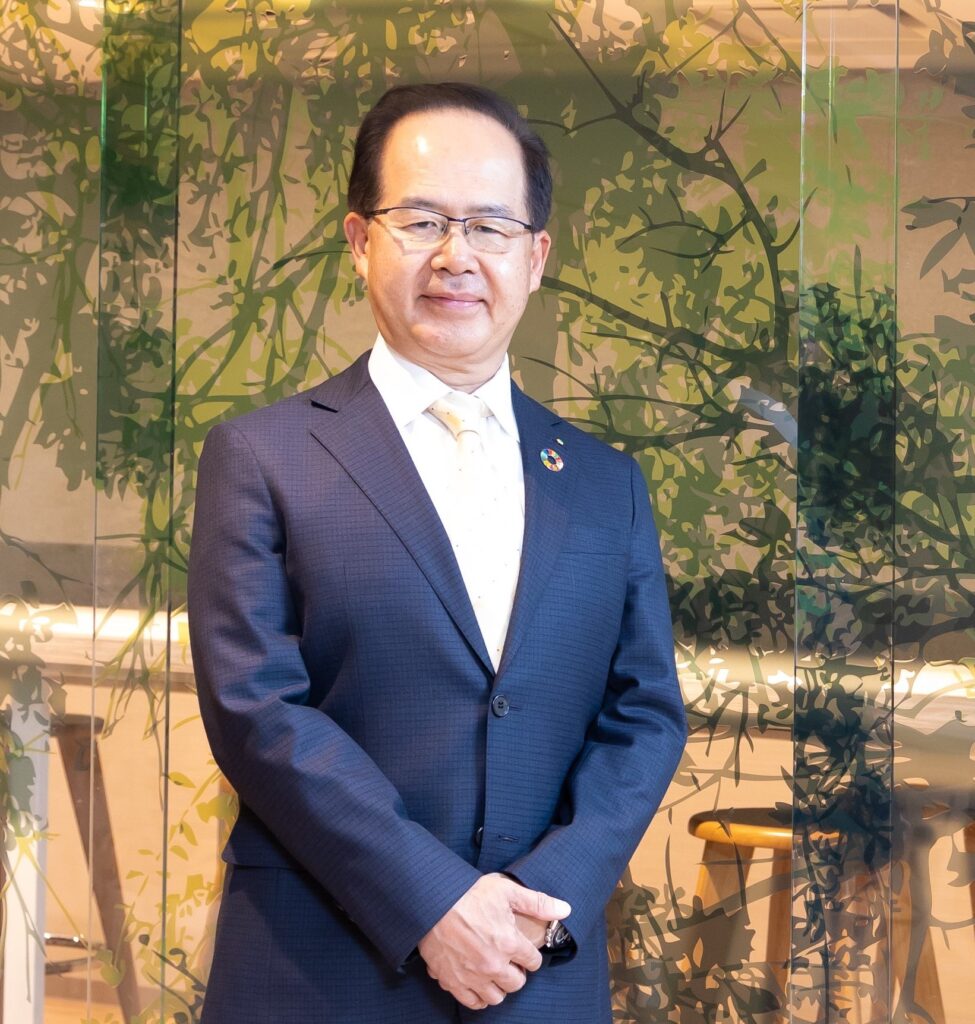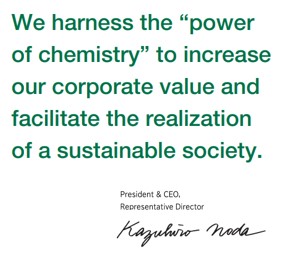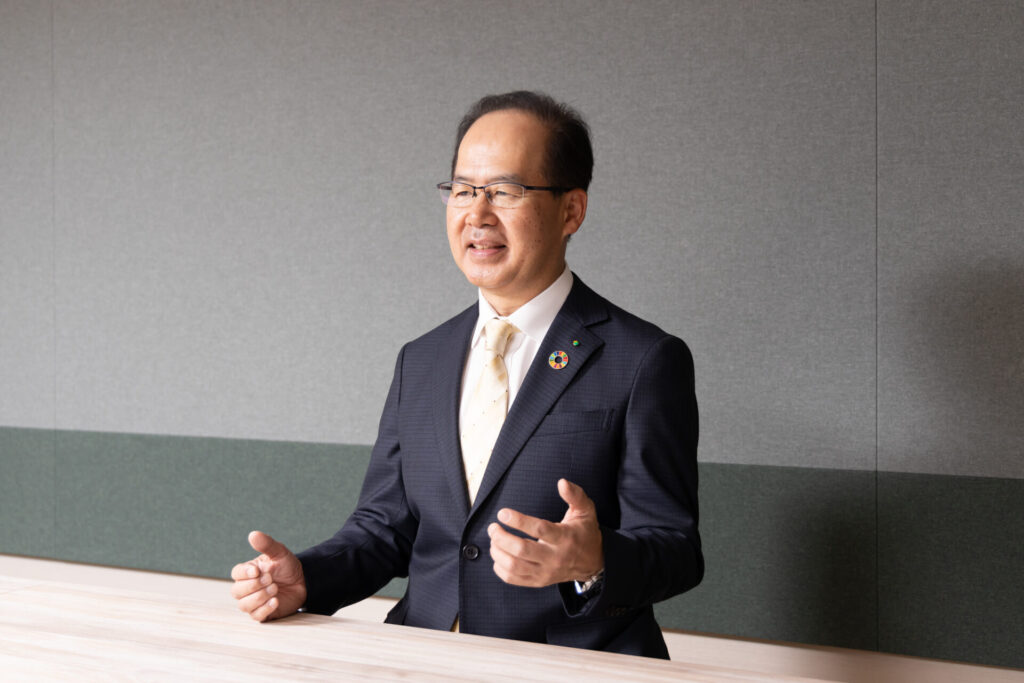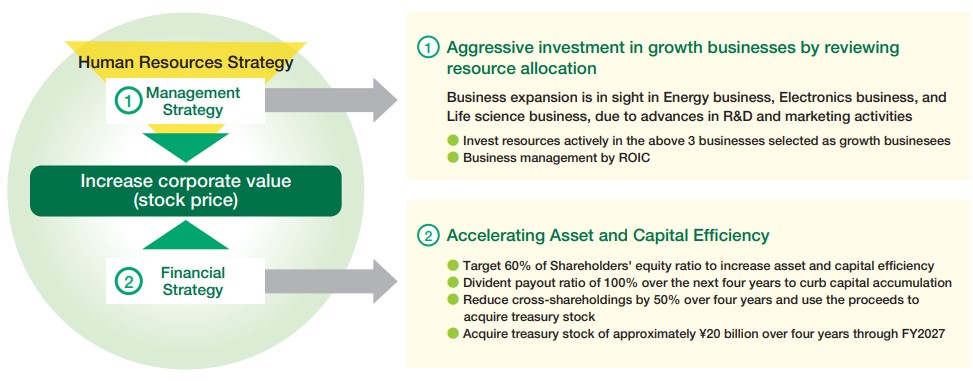Message from the President



To realize TechnoAmenity
We are said to be living in an era of rapid change and uncertainty, and even since I became president in June 2022, we have witnessed a variety of changes including rising inflation, increasing geopolitical risks, and the rapid depreciation of the yen. Through it all, I feel that people’s awareness of and interest in sustainability and global warming countermeasures are rising more than ever before.
Nippon Shokubai’s Group Mission is “TechnoAmenity: Providing prosperity and comfort to people and society, with our unique technology.” Our aim is to contribute to the realization of a sustainable society, one in which people can live comfortably and with a sense of security.
Protecting the global environment is our mission. We believe that technology, our strong suit, is what can make a difference in this day and age, when people truly desire to protect the global environment. The power of chemistry is essential to realizing a carbon-neutral, hydrogen-based society in the future. We intend to demonstrate our strengths so as to facilitate the realization of a sustainable society.
Adding new strategies to achieve our Long-term Vision
Under “TechnoAmenity for the future” which describes the long-term vision for FY2030 goals, Our Company has set the FY2022-2024 Mid-term Management Plan “TechnoAmenity for the future-Ⅰ,” with this year being the final year of the plan.
The Mid-term Management Plan struggle to “Business Transformation,” “Strategic Transformation for Environmental Initiatives,” and “Organizational Transformation.” We are making steady progress with respect to “Strategic Transformation for Environmental Initiatives” and “Organizational Transformation,” but it appears we are unlikely to achieve the objective for “Business Transformation” within FY2024.
Given this situation, we have decided to review our management and financial strategies this fiscal year, without waiting for the start of the next Mid-term Management Plan. In terms of our management strategy, we have decided to select business areas with potential for future growth, and to direct our resources to these areas in a concentrated manner. Additionally, with regard to our financial strategy, we have set new targets and policies so as to improve our capital efficiency.
Management Strategy
—Accelerating “Business Transformation” by concentrating resources on growth businesses
In the Solutions Business, we will concentrate our resources on three business areas with high future growth potential: Energy, Electronics, and Life Science. In the Energy business, we will work to globally expand our lithium-ion battery electrolyte (IONEL™) in line with the familiarization of EVs, and will also develop a range of products that support the production, transportation, and use of hydrogen. In the Electronics business, we will introduce next-generation optical materials and high-added-value products for semiconductors. In the Life Science business, we will expand our contract manufacturing services to oligonucleotides and peptides, which are medium-molecule APIs. In other businesses, we will also accelerate the expansion of businesses by proactively investing in specialty products, construction-related products, and others that are expected to see increased demand as products that contribute to the environment.
In the Materials Business, amid the ongoing restructuring trend of the chemical industry, we will review individual strategies for acrylic acid, superabsorbent polymer (SAP), ethylene oxide, and other products, to increase profitability as our core business that continues to cash-generate. We aim to stay ahead of the future trend toward decarbonization and low carbonization, and transition to a sustainable business model.
Financial Strategy —Improving asset and capital efficiency
We have reviewed our previous financial strategies and set new policies and targets so as to improve our asset and capital efficiency. Specifically, with the intention of optimizing our leverage levels, we have set a target of reducing our shareholder equity ratio to around 60% by the end of FY2027. Therefore, for the four years from FY2024, we will implement a dividend payout ratio of 100% (or a dividend on equity ratio of 2%, whichever is greater). Additionally, we will reduce our cross-shareholdings by 50% over a four-year period, and at the same time proceed with the acquisition of treasury stock. We will conduct ROIC-based business management to improve the profitability and capital efficiency of each business division.
Solving social issues through Environmental Contribution Products
—Strategic Transformation for Environmental Initiatives
Through energy conservation measures, the introduction of renewable energy, and other efforts, we have achieved a 15% reduction in greenhouse gas (GHG) emissions in FY2023 compared to that in FY2014. We also started producing bio-based acrylic acid and SAP using the mass balance system.
To achieve our FY2030 GHG reduction objective (a 30% reduction compared to FY2014), we will not only improve our catalyst performance to reduce CO2 emissions during production, but also expand our use of renewable energy and continue to switch to biomass raw materials. We are committed to solving social issues through businesses and products that contribute to reducing environmental impact by utilizing our catalyst technology and other resources.
Achieving sustainable growth through active participation of diverse human resources —Organizational Transformation
For a company to grow and evolve sustainably, it needs human resources possessing a variety of skills and perspectives. To unlock the full potential and growth of individual human resources, Our Company is undertaking various measures including expanding our educational options such as e-learning and implementing improvement activities at each workplace based on the results of engagement surveys. At the same time, it is increasing the number of mid-career hires so as to enhance its organizational diversity.
In an environment with a high degree of uncertainty, we cannot evolve if we continue to think along the same lines as before. In addition to developing human resources from a long-term perspective, we would like to bring together the power of diverse human resources who empathize with our Group Mission in order to transform this company.
To improve corporate value
Going forward, Our Company will actively invest in growth businesses and product groups that help solve social issues. We intend to increase our corporate value by adding new management and financial strategies to our current “three transformations” endeavor, and by swiftly implementing these initiatives. Furthermore, we will continue to contribute to the realization of a sustainable society through the power of chemistry.

